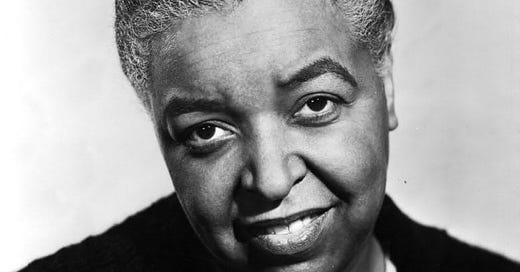Issue #859 Today In Black History, Monday, May 19, 2025
If you like us, REALLY like us, please click the little heart “Like” button at the top of this post!
Buttons:
Heart: Like Bubble: Comment Arrow Up: Share Arrows Circle: Restack
If you like us, REALLY like us, please click the “Like” button at the top of this post!
Your “Likes” mean a LOT to us! We appreciate your support!
Engage with us and our posts in Substack Notes, where we post almost daily.
Our May 2025 subscriber goals are 400 new free subscribers and 100 new paid subscribers! You can help us reach our goal!
Follow Pam on Bluesky, the best “X” alternative.
Follow Keith on Bluesky, the best “X alternative.
Independent Authors and Creative Professionals: Check out my valuable books and courses on Branding and Marketing just for you via Pam Speaks 2 You.
We appreciate your support!
Ethel Waters was born on October 31, 1896, in Chester, Pennsylvania, after a 17-year-old family friend raped her 13-year-old mother. Her journey to stardom began in the vibrant and creative world of the Harlem Renaissance.
Waters started singing and working as a maid in Baltimore at age 17, earning $4.75 a week. She eventually started singing and dancing professionally for $9.00 a week. She toured on the Black vaudeville circuit and started singing in clubs. Waters also performed during the Harlem Renaissance. In 1921, she became the fifth Black person to make a record.
Ethel Waters was also a gifted actress whose work broadened the horizons for Black performers in Hollywood. She made her film debut in 1929 and appeared in several groundbreaking roles. She starred in the 1949 film Pinky, for which she received an Academy Award nomination. She became only the second African American to be nominated for an Oscar after Hattie McDaniel, who won the Oscar for Best Supporting Actress in Gone With The Wind.
In addition to her film work, Waters made history on television. In 1939, she was the first African American to star in her own TV show, “The Ethel Waters Show.” In 1950, she became the first African American to star in her own television series, “Beulah,” although she left after the first season because she found the role degrading to Black people. Louis Beavers played the lead role for the last two seasons. Waters also performed many times on stage from 1919 through 1956.
Among the many awards Waters received were the Gospel Music Hall of Fame, a U.S. Post Office Commemorative Stamp, Emmy Award nomination, and three recordings inducted into the Grammy Hall of Fame.
Ethel Waters died on September 1, 1977, at age 80.
Today In Black History
In 1878, President Garfield appointed Blanche Kelso Bruce as Registrar of the Treasury.
In 1885, the first mass production of shoes using the lasting process of Black inventor Jan Matzeliger began.
In 1944, noted writer and civil rights activist W.E.B. Du Bois became the first Black member of the American Academy of Arts and Letters.
In 1965, Patricia R. Harris became the first Black woman ambassador, serving in Luxembourg.
In 1991, Willy T. Ribbs became the first Black driver to qualify for the Indianapolis 500.
All “We Are Speaking” posts are now free for everyone to read, and commenting on our posts is now open to everyone!
Share this post:
Share this publication:
Our subscriber goals for May 2025 include 500 new free subscribers and 100 new paid subscribers. Click the link to help us reach our goals!
Our paid subscribers are encouraged to discuss this post in our W.A.S. Chat Community.
Join Pamela Hilliard Owens’s subscriber chat
Available in the Substack app and on the web
You are also welcome to view “We Are Speaking” in Substack Notes. You can also read other Substack publications without subscribing to them when you join Notes.
Did you know that you can listen to each “We Are Speaking” post and engage directly with us on the Substack App? Download the app!
Please check out Keith’s AfroFantasy Detroit Substack for posts about fantasy, sci-fi, and Afrofuturism!









In 1963 Ethel Waters performed during a weekend at my high school auditorium (George Washington High School in San Francisco). The performance wasn't for our high school, but for the general audience, and there was an admission.
I went to see her perform with a friend of mine when we were 16 years old. We knew Waters was a jazz legend even then, but we didn't yet grasp just how legendary she truly was.
Thank you for your continued effort to inform us of the real history of fellow American citizens who were truly outstanding in their fields of endeavor in spite of quite challenging circumstances. Your work is appreciated